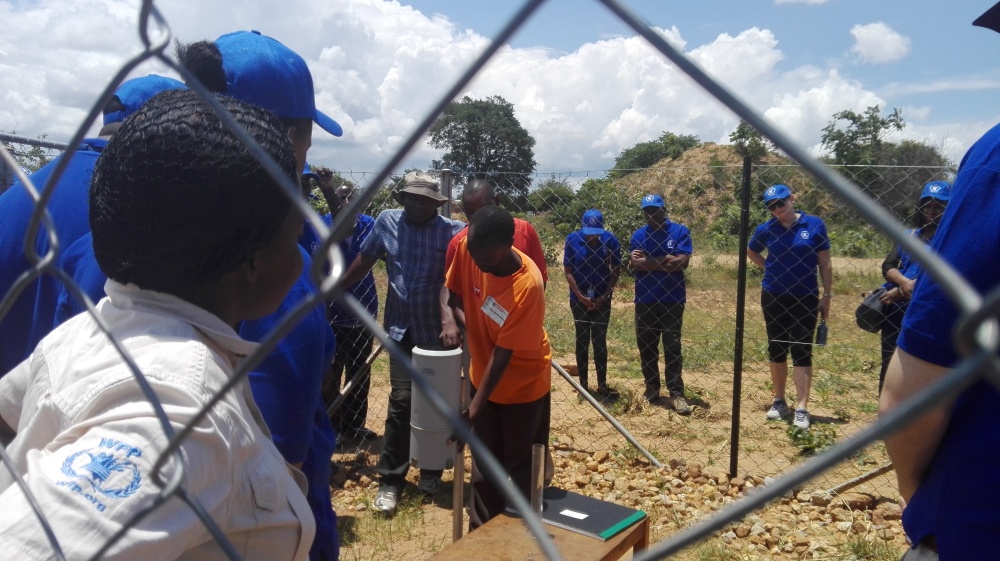By Friday Phiri
 A farmer explaining how he measures rainfall at a manual rain gauge station in Pemba district, Southern Zambia: Photo criedit–Friday Phiri
A farmer explaining how he measures rainfall at a manual rain gauge station in Pemba district, Southern Zambia: Photo criedit–Friday Phiri
Action on climate change and sustainable development together is the way forward for Africa, is the top-line message that regional, public and private sector delegates will carry to international climate negotiations after a week of deliberations in the Kenyan capital, Nairobi.
Some 800 delegates from 59 countries, including ministers and other high-level government and international officials, together with non-state delegates, offered their insights into the challenges and possible responses to climate change, and harvested those insights for consideration in the official international climate negotiation process.
The collecting of views – under the banner of the year-long Talanoa Dialogue launched at negotiations in Bonn, Germany, in November 2017 – was a key part of Africa Climate Week that just concluded in Nairobi.
According to the UNFCCC, the first regional Talanoa event since the launch in Bonn, brought out some key messages, which include the following;
- Public finance must be instrumental in unlocking private finance,
- Carbon markets are about doing more together, and doing more with less
- Energy is a high priority, affecting everything, hence, financial instruments should be put in place to de-risk investment and enhance involvement in smaller and medium-sized enterprises
- Achieving SDGs, including the climate one is the only way forward
- Businesses are ready to pick up new technology solutions, provided there is a good business case, and that the voice of the private sector is needed now more than ever.
And commenting on the agreed message, Erik Solheim, UN Environment Executive Director, said at the closing of the first Africa Climate Week, and of the Week’s cornerstone event, the 10th Africa Carbon Forum that: “We are engaged across most of the Sustainable Development Goals and clearly focusing on how to create synergy between the different goals and especially with the climate goal, which is essential for achievement of all the other goals.”
The UN’s 2030 Sustainable Development Agenda details 17 global goals covering poverty, hunger, health, education, climate change, gender equality, water, sanitation, energy, urbanization, environment and social justice.
“Africa can, should and will be the leader of ambitious climate change action in the world,” said David On’are, a Director at Kenya’s National Environment Management Authority (NEMA), citing a key message coming out of regional ministerial discussions that took place this week in Nairobi. “There is the need to raise ambition, interest, innovation and mobilize the necessary means of implementation to address climate change.”
Countries agreed in Paris in December 2015 to limit global average temperature rise to 2 degrees Celsius and work toward a safer 1.5-degree goal. In coming to their agreement in Paris, countries also recognized that success will require broad-based climate action by all sectors of society, both public and private, and by individuals.
“To achieve our goals, we need more ambition and action. Not just by national governments—they cannot do it on their own—but by all levels of government, business, investors and everyday people working together,” said Patricia Espinosa, Executive Secretary, UN Climate Change, at a high-level session on Thursday.
Africa Climate Week, which was held from 9-13 April, was hosted and supported by the Government of Kenya and organized by the Nairobi Framework Partnership, together with NEMA. The Nairobi Framework Partnership (NFP) is celebrating this year its 10th anniversary, as is the Africa Carbon Forum, which was launched by NFP to spur investment in climate action through carbon markets, mechanisms and finance.
The NFP members include: the African Development Bank, Asian Development Bank, International Emissions Trading Association, United Nations Environment Programme (UNEP), UNEP DTU Partnership, United Nations Conference on Trade and Development, United Nations Development Programme, UN Climate Change, and World Bank Group.
Cooperating organizations include: Africa Low Emission Development Partnership, Climate Markets and Investment Association, Development Bank of Latin America, Institute for Global Environmental Strategies, Inter-American Development Bank, Latin American Energy Organization and West African Development Bank.
In adding his voice to the deliberations, Al Hamdou Dorsouma, Manager for Climate and Green Growth Division at the African Development Bank (AfDB) said:
“The African Development Bank believes that Nationally Determined Contributions (NDCs) are an opportunity for African countries to put sustainability at the center of their long-term development. The dialogue at this first Africa Climate Week demonstrated the ambition and determination by both state and non-state actors, as well as development partners, to push for expanding green and resilient investments, which enable Africa to leapfrog to high impact and clean technologies in productive sectors. The African Development Bank fully supports this ambition through its High 5 priorities, that, when fully implemented, will help Africa to achieve about 90% of its Sustainable Development Goals and 90% of its Agenda 2063.”
Meanwhile, Venkata Ramana Putti, Program Manager, Carbon Markets and Innovation at the World Bank believes “Carbon markets and pricing has huge potential to help tackling climate change, and contributing to sustainable development, hence the need to give it attention through a strong collaboration at domestic and regional levels.”
And Climate Technology and Network Centre (CTCN) Director, Jukka Uosukainen, says since the Paris climate Agreement in France in 2015, African governments have started asking for technological support in tackling climate that adversely affects the continent.
“By serving as a bridge between developing countries’ technology needs and the proven expertise of finance, private sector and research experts from around the world, the Climate Technology Centre and Network (CTCN) builds partnerships that achieve countries’ climate and development objectives. This forum was a great opportunity to share best practices and lessons learned in Africa.”